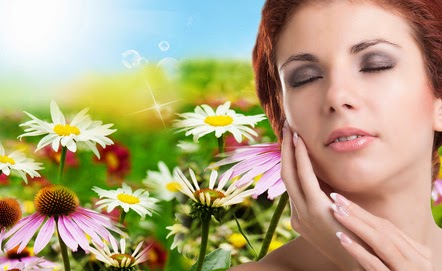How to Get Lighter Skin Naturally and Safely
Needles to say, skin whitening (aka skin lightening) is a
controversial topic. However, there is more to this as we shall see shortly.
Throughout history, many cultures have adapted cosmetic
regimens that centered around the whitening of the skin. This was often tied to
concepts of social elevation and purity associated with the color white in the
natural environment.
But perhaps most importantly,
these cosmetics functioned to conceal the blemishes incurred by exposure to the
environment, disease, and inadequate nutrition.
The ancient Greeks employed a pigment made with powdered
lead, which had obvious negative impacts on health and sanity, even in their
own estimation. Ancient Chinese gentry often used a paste made with kaolin, the
white clay found along the banks of the Jiangxi River.
Modern Skin Lightening Regimens
There are a number of ways you can affect a lighter shade of
skin today. These range from complex surgical procedures involving lasers to
organic bleaching agents found in many fruits and plants.
Individuals may elect to lighten their overall skin tone due
to remnants of a less savory cultural ideology that associates skin lightness
with personal worth—a rather deplorable but pernicious hallmark of European
Imperialistic Hegemony and its racist connotations.
That being said, there are also a number of other cosmetic
reasons to pursue a lightening regime. Age spots, sun damage, birthmarks,
scars, and other blemishes can impact your self-image disproportionately. Rather than undergoing costly and painful
laser treatment therapy, an ideal solution would be one that used natural
ingredients and could be applied topically or ingested.
These products are available on the open market or by
dermatologist prescription, and include the following (this is just a small
list as there are many more):
- GSH This substance is synthesized in all mammalian cells from the components glycine, cysteine, and glutamate. It’s also found in watermelon, avocado, broccoli, spinach, and tomatoes. It is often administered orally.
- L-cysteine peptide This is found naturally in poultry, egg yolks, yogurt, Brussels sprouts, red peppers, broccoli, onions, garlic, oats, and other foods. Because it performs similar internal functions as GSH, but is many times more powerful, it does have potential to act as a skin lightening agent, but scientific evidence is still lacking to date.
- Vitamin C Large doses of topically applied vitamin C, with accompanying fruit acids, provide bleaching effects.
- Hyaluronic acid
- Lycopene
- Kelp
- Olive leaf extract
- Hawthorn, jujube, bearberry extract, Glyeyrrhiza glabra extract and other collagen bearing, acidic plant based therapies. These are largely a part of holistic pharmacopeias and have not been subjected to rigorous scientific analysis.
Once more, the above is but a small list of substances that
may help in brightening of skin. This area is extensively studied and more substances
get added virtually daily. Some informational products may point toward natural ways to lighten your skin.
Best Natural Skin Whitening Products
Finding the best skin lightening products is not always
easy. Safety should always be first on choosing these. This is why you should go for a product that is made natural
ingredients. Chemical substances can have serious negative and often long-term effects
and are best avoided.
One possible option for a topical skin lightening treatment
is Dermology Skin Brightener Cream. Containing a proprietary blend of natural
ingredients, this product may help promote a skin that looks healthy, bright,
light and young.
This product contains arbutin, Shea butter, evening
primrose, and vitamins A, C, and E, among other natural ingredients.
Conclusion
Plant extracts that act to inhibit the production of melanin
in the skin cell provide a longer lasting result. In the past, skin bleaching
was dangerous, painful, and temporary. Natural skin whitening products offer a
safer, pain-free, and long lasting solution to cosmetic lightening needs of
today’s market.
Resources
Contents on this webpage are provided for your information only and may not be construed as medical advice or instruction. The contents and/or products are not intended to diagnose, treat, cure, or prevent any disease. You should consult appropriate health professionals on any matter relating to your health and well-being.



No comments:
Post a Comment